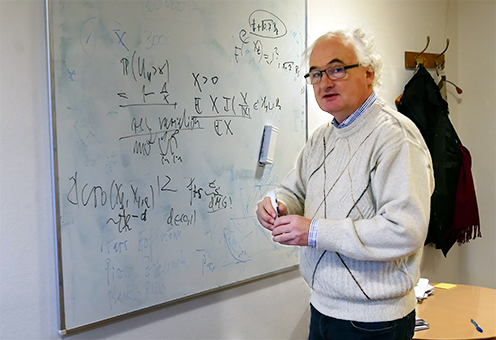Professor Thomas Mikosch receives the Humboldt Prize
The Humboldt Research Award has been granted to Professor Thomas Mikosch, professor in actuarial mathematics at the Department of Mathematical Sciences, in recognition of his past accomplishments in research and teaching.
 The Humboldt Research Award is granted in recognition of a researcher's entire achievements to date - to academics whose fundamental discoveries, new theories, or insights have had a significant impact on their own discipline and who are expected to continue producing cutting-edge research in the future.
The Humboldt Research Award is granted in recognition of a researcher's entire achievements to date - to academics whose fundamental discoveries, new theories, or insights have had a significant impact on their own discipline and who are expected to continue producing cutting-edge research in the future.
In addition to the prize of EUR 60,000, Thomas Mikosch has been invited to spend a period cooperating on a long-term research project with specialist colleagues at a research institution in Germany and is eligible for further support from the Humboldt foundation, for example in connection with hosting postdoctoral researchers from Germany:
"I plan to visit the Department of Statistics at Ruhr-Universität Bochum," says Thomas. "I expect to visit them for 12 months during 2018/2019. And I look forward to then continuing the cooperation by inviting my German colleagues and co-authors here to Copenhagen".
Academics from abroad, regardless of their discipline or nationality, may be nominated for a Humboldt Research Award by established academics in Germany. The Humboldt Foundation grants up to 100 Humboldt Research Awards annually.
Thomas receives the award in March in Bamberg at the 46th Symposium for Research Award Winners. Here all the prize winners, the prize committee and members of the Alexander von Humboldt Fund meet.
Former Danish Humboldt Prize winners in the mathematical sciences include Ib Madsen (1992), Ole Barndorff-Nielsen (2001), Uffe Haagerup (2008) and Steffen Lauritzen (2016).
Thomas Mikosch got his Master degree in Mathematics at TU Dresden (1981), defended his PhD in Probability Theory at St. Petersburg University (1984), his Habilitation at TU Dresden (1990). Before he joined the University of Copenhagen on 1 January 2001, he worked at TU Dresden, ETH Zürich, ISOR Wellington and RUG Groningen.
